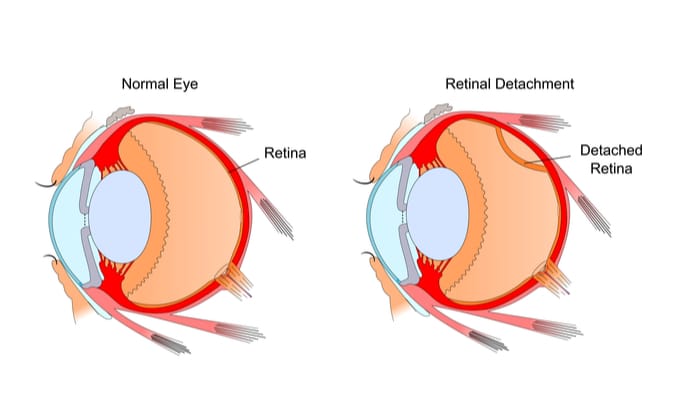
What is Retinal Detachment?
Retinal detachment is an eye disorder that can lead to permanent vision loss and blindness. Certain forms of retinal detachment are considered a medical emergency and must be treated promptly to save vision. This disorder happens when the retina separates from the underlying layer in the back portion of the eye. Initially, the detachment may be localized, but without treatment, the entire retina could become detached. Many different conditions can lead to retinal detachment, which is why it is important to get your eyes examined regularly by an eye care specialist at Boston Vision.
Symptoms
When the retina becomes detached, it is separated from its blood supply and no longer functions properly. Symptoms of retinal detachment are:
- Flashes
- Floaters
- Shadow or curtain in the peripheral vision
Who is at Risk for Retinal Detachment?
Risk factors for developing retinal detachment include:
- Areas of retinal thinning called lattice degeneration
- Nearsightedness
- Advanced age
- Previous retinal detachment
- Previous eye surgery
- Trauma
- Family history of retinal tears or retinal detachment
If you fit any of these elements, then get your eyes examined regularly to keep your vision intact.
Treatment for Retinal Detachment
Your retina specialist at Boston Vision will perform a detailed eye exam, paying special attention to the peripheral retina. If retinal detachment is found, treatment options will be discussed. The treatment options are Scleral buckle, vitrectomy, pneumatic retinopexy, and laser surgery.
Scleral Buckle
In this surgery, a polymer band is placed around the eye to support the retina and resolve retinal detachment. The band is placed under the layer that covers the eye and is invisible after the surgery is completed. the benefit of scleral buckle surgery is that it usually does not require positioning of the head after the surgery.
Vitrectomy
During this surgery, the vitreous gel is removed and fluid from under the retina is drained. Then the surgeon may use a laser or freezing treatment to seal the retinal tears. The eye will be filled with a special gas or oil bubble to hold the retina in place while it is healing.
Pneumatic Retinopexy
This is an in-office procedure. During the procedure, a gas bubble is injected into the eye. The tear itself will be sealed with a freezing treatment or with a laser.
Laser Surgery
Occasionally and for certain types of retinal detachment, a laser procedure could be done to stop progression of retinal detachment.
Schedule a Consultation
If you notice any signs or symptoms of a retinal detachment, seek treatment immediately. At Boston Vision, our team strives to give patients quality, effective care that helps to preserve their vision.
To schedule your appointment, book online with us or email us at help@bostonvision.com to get started.





